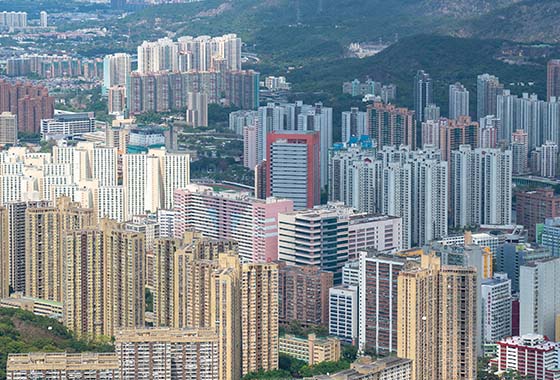Our Hong Kong Foundation Advocates the “Subsidised Homeownership Scheme” Housing Policy to Narrow Wealth Gap; Increasing Land Supply to Improve People’s Livelihood

(From left to right) William Tsang, OHKF Senior Researcher; Eva Cheng, OHKF Executive Director; Professor Richard Wong, Philip Wong Kennedy Wong Professor in Political Economy at the University of Hong Kong; Stephen Wong, OHKF Deputy Executive Director and Head of Public Policy Institute
(23rd October 2017, Hong Kong) Our Hong Kong Foundation (OHKF) launched its third report of the Land and Housing Research Series, and is summarised as below:
1. Meeting the housing needs of grassroots citizens needs to follow a multi-pronged approach: The severe shortage of public housing is particularly pronounced in the short- and medium-term. The Government must satisfy the housing needs of grassroots citizens. OHKF supports the government to increase and expedite housing supply under a “public-private partnership” scheme;
2. Facilitating homeownership for Hong Kong people to share fruits of economic prosperity: OHKF recommends that the Government strive to help citizens become homeowners. As more citizens own assets, the wealth gap can be narrowed as economic benefits are shared through the appreciation of land and property values;
3. Capping unpaid land premium of subsidised sale flats to share wealth with the people: We encourage the Government to address the issue of the current mechanism determining unpaid premium for subsidised sale flats (e.g. HOS and TPS), which renders the amount unaffordable for a large number of people. To share wealth with the people, OHKF recommends selling public housing units at development cost and capping the amount of unpaid premium;
4. Releasing land value so that public resources can be spent most effectively: The Government is recommended to extend the mechanism of “capping unpaid premium” to all future supply of subsidised sale flats. This will release the land value embedded therein, ensuring the financial sustainability of the public housing system and allowing redirection of public funds to other areas of necessity;
5. Restarting large scale reclamation outside the Victoria Harbour for the development of new towns as soon as possible: To support the development of well-planned new towns with sufficient amenities, Hong Kong needs large, flat and undivided land. Among the many options to increase land supply, restarting large-scale reclamation outside Victoria Harbour is relatively cost-effective and less controversial solution that has been proven successful in the past; and
6. Establishing sizeable land reserve so that supply could be adjusted according to demand: Over the past decade or so, there has been a significant absence of large-scale land development projects completed in Hong Kong, heavily restricting the supply of all kinds of property. The ideal solution in the long-term is to build a significant land reserve. The Government can thereby, whenever necessary, adjust the supply of land according to the dynamic needs of society and the economy.

Housing Policy Recommendation of “Subsidised Homeownership Scheme” (SHS): Sale of Public Housing at Development Cost and Capping the Unpaid Premium
In the past decade, there has not only been a severe shortage of housing, the housing ladder has also broken as well. Tenants of public rental housing (PRH) lack homeownership opportunities; and the land premium mechanism has a negative impact on the current owners of Tenant Purchase Scheme (TPS) and Home Ownership Scheme (HOS) units. Since the amount of the unpaid premiums are linked with the prevailing market prices, they can never keep up with the skyrocketing prices, and can never exit the public housing system to become homeowners in the private market. Meanwhile, the Government has to bear the financial burden from subsidising the construction and operating costs of PRH perpetually. For all the three parties (PRH tenants, HOS and TPS owners, and the Government) involved, the prevailing public housing policy does not deliver an ideal outcome.
The research team of this report is led by Professor Richard Wong, Philip Wong Kennedy Wong Professor in Political Economy at the University of Hong Kong. He believes that under the current public housing policy, precious land value cannot be released and the Government should strive to help citizens become homeowners. As more citizens own assets, the wealth gap can be narrowed as economic benefits are shared through the appreciation of land and property values. In addition, the construction and operating costs impose a heavy and ongoing financial burden for the Government. Over the long-term, housing policy reform is an issue the Government must confront. He points out that the Government should review the existing financial model of the public housing system, to ensure its stability and sustainability, ultimately to allow the redirection of public funds to other areas of necessity.
The “Subsidised Homeownership Scheme” advocated by OHKF is a homeownership-oriented housing policy, where pricing is linked to the development cost and the amount of unpaid premium is capped, so that wealth could be shared with the people. As a hypothetical example, a unit with the market value of $4 million (HKD, the same below) will be sold for $1 million. The difference of $3 million (i.e. the unpaid premium) will be capped at the date of initial purchase, instead of being linked with the fluctuating market prices. This allows eligible households to make better plans and settle unpaid premiums in accordance with their own conditions and become the “bona fide” owners of their homes.
Moreover, the Government may consider introducing different features in the determination mechanism of unpaid premiums to encourage buyers of SHS units to settle unpaid premiums. These options include: (i) providing discount on early repayments, (ii) charging interests on the unpaid premiums after the lock-up period, (iii) allowing the repayment of unpaid premiums in instalments, and/or (iv) averaging the unpaid premiums downward when market values decrease.
The report recommends implementing the “Subsidised Homeownership Scheme” in four phases. Firstly, a pilot scheme could be introduced where SHS units would be sold to families eligible for “Green Form Subsidised Homeownership” units; new HOS units, and “Starter Home” units. If the pilot scheme is widely accepted, it can be expanded to cover all future supplies of public housing. Subsequently, the Government can consider granting current HOS and TPS homeowners the option to settle their unpaid premiums using the same mechanism. Finally, all existing public housing units could be privatised in phases. The report expects that if these four phases are to be implemented smoothly, some 75% of families could be homeowners in 30 years’ time.
Founding Chairman of OHKF, Mr. Tung Chee-hwa, comments that, “Chief Executive Mrs. Carrie Lam has strived to respond to the many appeals of society in her first Policy Address. Her tireless efforts and good intentions are much appreciated by the people. As far as housing policy is concerned, she proposes to focus on homeownership and is committed to re-establish a housing ladder, and I strongly agree. As the old saying goes, ‘one shall have his peace of mind when he possesses a piece of property’(有恆產者有恆心). When more Hong Kong people own their homes and can share the fruits of economic prosperity, the society is set to become more stable and harmonious”.
Land Policy Recommendation: Aggressive Reclamation Outside Victoria Harbour – Developing Land for People’s Livelihood
The problem of land and housing shortage is severe and the shortage of public housing is particularly pronounced in the short- and medium-term. The Government must take numerous measures to satisfy the housing needs of grassroots citizens. In the short to medium-term, the report proposes a public-private partnership (PPP) scheme to release the development potentials of privately owned land resources. To speed up the supply of housing, the Government can consider improving the infrastructure of nearby roads and raising the plot ratios. As part of the PPP scheme, private landowners are required to settle fully the differential land premium and help to provide additional public housing units. OHKF believes that if a fair and transparent mechanism could be rolled out expeditiously, PPP has the potential to be one of the practical solutions to the city’s land and housing problem in the short- to medium-term.
The report recommends more resources should be dedicated to the relevant departments, and an office for the Director for Land Development should be established. The Director would be empowered to coordinate decisions regarding land development approvals. Land and housing supply can be hastened by speeding up the approval procedures and cutting red tapes. Furthermore, the government should continue to standardise technical definitions and approval criteria of different departments. The report also analyses data on property market transactions and points out that demand management measures imposed over the past eight years have suppressed more than just investment and speculative demands, but are in fact hurting end-users as well, urging the Government to comprehensively review the cost-effectiveness of these measures.
For long-term recommendations, the report points out that to support the development of well-planned new towns with sufficient amenities, Hong Kong needs large, flat and undivided land. To this end, among the many options to increase land supply, restarting large-scale reclamation outside Victoria Harbour is relatively cost-effective and less controversial solution that has been proven successful in the past. In April this year, OHKF has proposed that sites in South Cheung Chau, Tseung Kwan O, Tuen Mun, etc., can provide up to 3,500 hectares of land when reclaimed. If these proposals are accepted, the consolidation of all existing port facilities currently scattered around Hong Kong could be considered, creating an integrated container terminal on the South Cheung Chau artificial island. This will free up more precious urban space, which can be developed or used to optimise the city’s coastline.
The report also opines that the so-called “urban residential idle land” or “reserved village-type development land” discussed within the community actually consist mostly of scattered parcels of land which cannot support large-scale development. Over the long term, Hong Kong needs to establish a land reserve so that the government can adjust the supply of land according to the dynamic needs of society and the economy.



